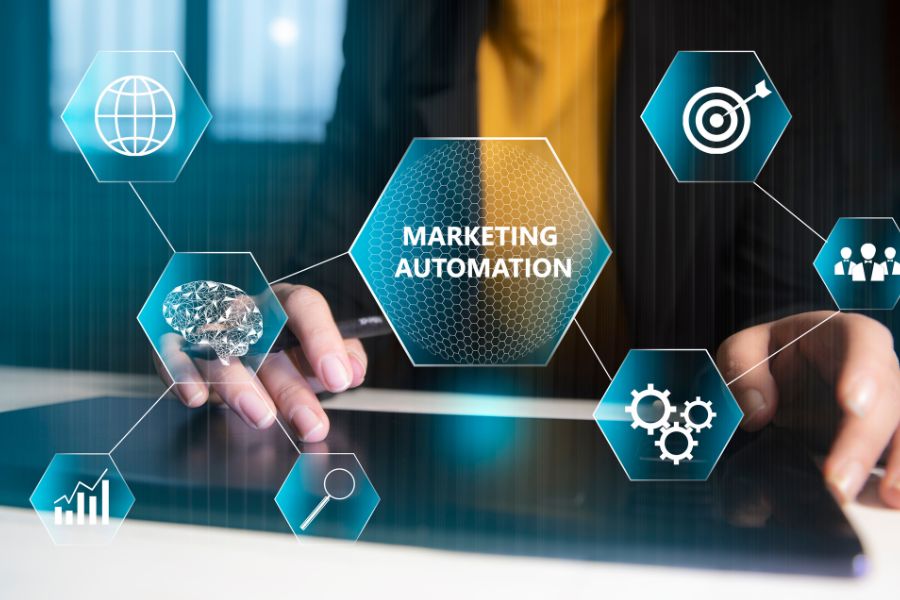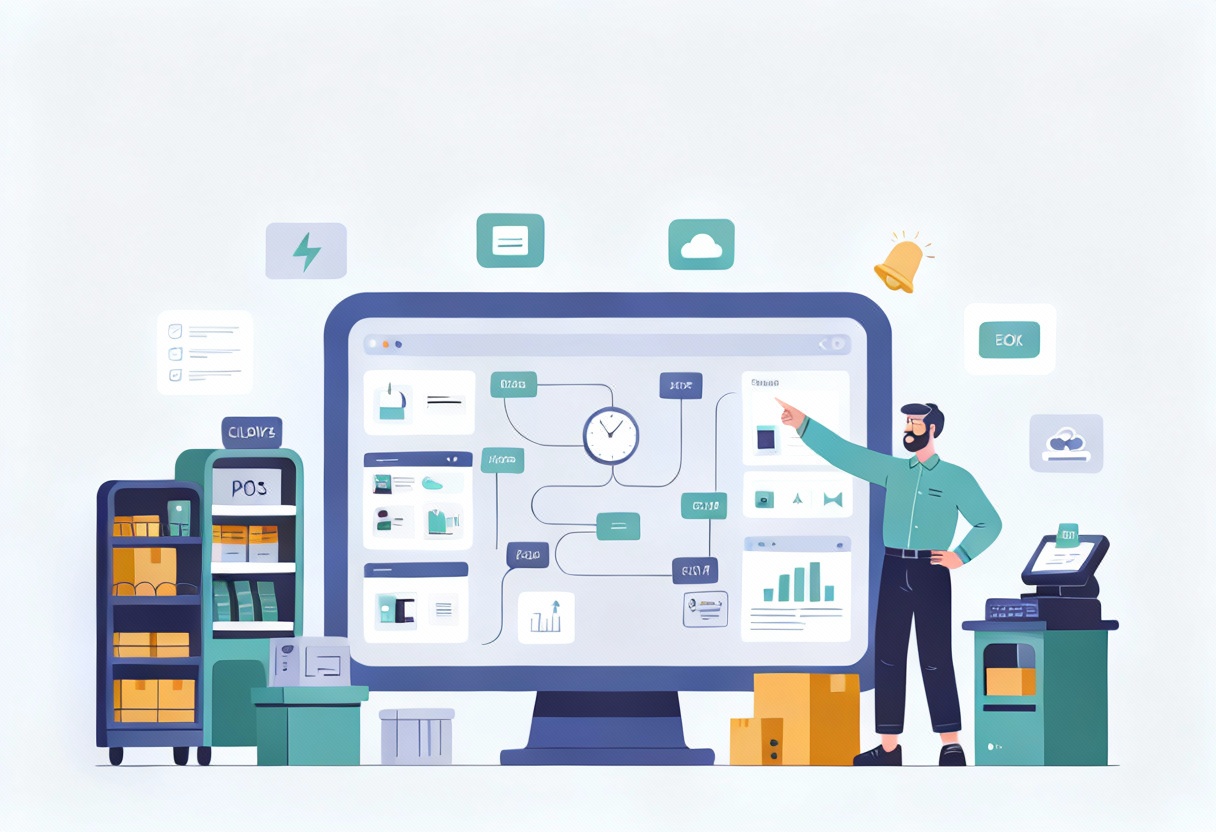Enterprise marketing automation has transformed the way large organizations engage with customers, streamline campaigns, and drive measurable results. By leveraging advanced tools and data-driven strategies, enterprises can deliver personalized messaging at scale, track performance in real time, and optimize every step of the customer journey.
But what about small and medium-sized enterprises (SMEs)? Many business owners wonder if the same sophisticated methods are out of reach due to limited budgets, resources, or technical expertise. The good news is that, with the right approach and scalable tools, SMEs can adopt marketing automation strategies effectively, improving customer engagement and driving growth without the complexity of a large enterprise setup.
In this article, we’ll explore what enterprise marketing automation entails and how SMEs can implement similar strategies successfully.
Highlight:
- Enterprise marketing automation empowers large businesses to scale, personalize, and track marketing across channels with precision.
- SMEs can achieve similar automation benefits using affordable, scalable tools tailored to their size and growth goals.
What Is Enterprise Marketing Automation?
Enterprise Marketing Automation (EMA) uses specialized software to automate and streamline complex, high-volume marketing tasks for large organizations, enabling them to manage customer engagement across multiple channels and teams. Unlike standard marketing automation, EMA handles vast datasets and sophisticated, multi-layered workflows, delivering personalized experiences at scale to improve efficiency and achieve strategic marketing goals.
Unlike standard automation tools, enterprise-level platforms are built to handle the complexity of large organizations. They offer seamless integration with customer relationship management (CRM) systems, data warehouses, and AI-powered analytics engines to deliver personalized experiences at scale.
According to Salesforce, companies that fully integrate marketing automation with their CRM see a 27% increase in conversion speed and a 40% boost in average deal size, highlighting the significant impact on both efficiency and revenue.
Key Features of Enterprise Marketing Automation Platforms
Enterprise marketing automation platforms offer robust tools to support complex, large-scale operations by streamlining, personalizing, and optimizing every stage of the marketing journey.
- Cross-Channel Campaign Management: Smoothly coordinate campaigns across email, social media, web, mobile, and more to ensure a consistent brand experience.
- Advanced Customer Segmentation: Create highly targeted audience segments based on demographics, behavior, purchase history, and engagement levels for more effective messaging.
- Behavioral Tracking and Predictive Analytics: Monitor customer interactions in real time and leverage AI to predict future behaviors, allowing for timely and relevant outreach.
- CRM Integration: Synchronize marketing efforts with sales by integrating with enterprise CRM systems, guaranteeing accurate data flow and aligned strategies.
- Lead Scoring and Lifecycle Management: Automatically score leads based on engagement and move them through predefined stages of the buyer journey to accelerate conversion.
- AI-Powered Personalization: Deliver personalized messages, offers, and content at scale using artificial intelligence to enhance relevance and drive engagement.
- Dynamic Content Delivery: Serve tailored content to users based on their profile, behavior, or funnel stage across web pages, emails, and ads.
- Enterprise-Grade Data Security: Confirm compliance and protect customer data with advanced encryption, role-based access controls, and secure cloud infrastructure.
- Custom Reporting and Real-Time Dashboards: Access in-depth analytics and live dashboards that provide actionable insights into campaign performance, ROI, and customer behavior.
Why Do Enterprises Invest Heavily in Marketing Automation?
With marketing automation tools, large businesses can operate at scale, maintain brand consistency, and improve ROI through efficient customer engagement and data-driven decision-making.
Scalability and Consistency
One of the primary reasons enterprises adopt marketing automation is scalability. Large organizations often manage thousands of simultaneous campaigns across various product lines, geographic regions, and digital platforms. Without automation, executing these campaigns consistently and efficiently would be nearly impossible.
Enterprise marketing automation platforms allow teams to standardize workflows and templates, confirming that brand messaging remains consistent regardless of market or channel. At the same time, automation tools offer the flexibility to localize and personalize content based on audience behavior, language, or region without compromising corporate standards. This balance of uniformity and customization is essential for global marketing success.
►►► Optimal solution set for businesses: Multi store POS, Next-gen POS, Inventory Management Software (MSI), Self Service, Automation, Backorders
Enhanced ROI and Attribution
Marketing automation makes it easier to track the entire buyer journey and attribute revenue to specific campaigns or touchpoints. This visibility into performance allows marketing teams to optimize spend and prove ROI more effectively.
According to Invesp, 76% of companies that use marketing automation see a positive ROI within the first year. Furthermore, Nucleus Research reports that automation increases marketing productivity by 14.5% and reduces overhead by 12.2%.
Customer Lifecycle Management
Automation empowers enterprises to manage the entire customer lifecycle. Personalized messages delivered at every stage of onboarding, engagement, and upselling can increase customer interaction and build lasting loyalty.
For example, Epsilon research shows that 80% of consumers are more likely to make a purchase when brands offer personalized experiences, which enterprise automation platforms can deliver efficiently through AI-driven segmentation and behavior-based triggers.
Is It Impossible for SMEs to Follow The Same Method?
No, marketing automation is not impossible for SMEs. While enterprises may use high-end, complex systems, small and medium-sized businesses can still adopt automation at their own scale, often with leaner tools and quicker implementation.
What SMEs Can Learn from Enterprise Automation
Enterprises have mastered the art of data-driven marketing, personalized engagement, and streamlined customer journeys and SMEs can absolutely follow suit by applying these principles with the right-sized tools.
- Prioritize customer data: Just like enterprises, SMEs should gather and analyze customer behavior to tailor messaging and improve targeting.
- Use segmentation and triggers: Automate emails, follow-ups, or offers based on actions like website visits, cart abandonment, or purchase history.
- Focus on ROI tracking: Implement tools that offer performance tracking, even on a smaller scale, to identify what works and double down on high-performing channels.
- Adopt scalable platforms: Many automation solutions like HubSpot, Mailchimp, or Zoho offer entry-level plans suitable for SMEs, with room to grow as the business expands.
Why and how SMEs can implement marketing automation
Why SMEs Should Automate
- Save Time & Resources: Automating repetitive tasks like email follow-ups or social media posting frees up valuable human resources.
- Increase Lead Conversion: Automated lead nurturing can improve conversion rates by up to 77%, according to Forrester.
- Boost Customer Retention: Consistent, personalized communication improves loyalty and encourages repeat purchases.
How SMEs Can Start
- Set Clear Goals: Identify the specific processes to automate (e.g., lead generation, follow-up, onboarding).
- Choose the Right Tool: Start with platforms built for small teams Mailchimp, ActiveCampaign, or Brevo (formerly Sendinblue) are affordable and user-friendly.
- Start Simple: Launch a basic email workflow or retargeting campaign before scaling up.
- Monitor and Optimize: Use analytics to refine automation flows and improve performance over time.
ConnectPOS – The Top Choice for Enterprise Marketing Automation
ConnectPOS is a powerful unified cloud POS with a marketing automation feature. It helps businesses of all sizes optimize customer engagement, drive sales, and streamline operations across physical and digital channels. Built for modern commerce, ConnectPOS bridges the gap between in-store and online interactions.
With ConnectPOS, enterprises and ambitious SMEs gain access to a full suite of enterprise-grade features, including:
- Seamless CRM and eCommerce Integrations: Connect easily with Shopify, Magento, and WooCommerce. Sync customer data, order history, and product details in real time.
- AI-Powered Recommendations and Upselling Tools: Offer smart product suggestions based on browsing history, purchase behavior, and preferences. Boost average order value and customer satisfaction.
- Customer Segmentation and Loyalty Automation: Create dynamic customer segments. Automate reward campaigns, points, and referral bonuses to retain customers and drive repeat purchases.
- Multi-Channel Email and SMS Campaigns: Run timely campaigns through email and SMS. Use advanced scheduling, personalization, and tracking to maximize impact.
- Real-Time Analytics and Custom Reports: Track performance and spot trends. Make better decisions with intuitive dashboards and detailed reports.
- Scalable Pricing and Modular Solutions: Start small or go global. ConnectPOS offers flexible plans and modules that grow with your business.
FAQs: What Is Enterprise Marketing Automation?
- Is marketing automation only for big companies?
No. While enterprise tools are robust, many affordable marketing automation tools are tailored for SMEs. Platforms like ConnectPOS offer scalable solutions with enterprise-level power.
- Can SMEs achieve similar results with cheaper tools?
Yes. With focused goals and the right platform, SMEs can drive significant ROI, even with low-budget automation strategies.
- Which industries benefit most from enterprise marketing automation?
Retail, SaaS, healthcare, finance, education, and eCommerce all benefit. Any industry aiming to scale customer engagement and streamline workflows can leverage automation.
Conclusion
To sum up, enterprise marketing automation isn’t reserved solely for tech giants. With robust features like behavioral tracking, AI personalization, multichannel campaign orchestration, and CRM integration, these platforms provide unmatched control and insight over the full customer journey.
But the benefits of this technology are no longer exclusive to enterprise giants. Today, SMEs have a real opportunity to tap into automation’s power by adopting flexible, scalable solutions that suit their size and growth pace.
If you’re exploring what is enterprise marketing automation and how it can support your business objectives, now is the time to take action. ConnectPOS empowers businesses of all sizes to streamline operations, increase customer loyalty, and improve ROI through intelligent automation.
Contact us today and take your marketing to the next level.
►►► Optimal solution set for businesses: Shopify POS, Magento POS, BigCommerce POS, WooCommerce POS, NetSuite POS, E-Commerce POS



